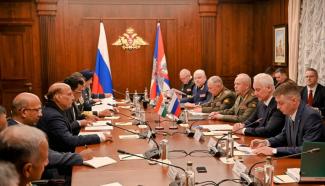India-Russia “Special and Privileged Strategic Partnership” Reaches New Heights
The India-Russia relationship has entered a new phase, marked by intensified bilateral engagements over the past six months. Prime Minister Narendra Modi visited Moscow twice this year, in July and October, to strengthen ties with Russia, a steadfast ally. Most recently, Defence Minister Rajnath Singh’s three-day visit to Moscow (December 8–10, 2024) signaled a new chapter in the India-Russia defence partnership. These developments have elevated their 75-year-long friendship to a "Special and Privileged Strategic Partnership."
Defence Minister Rajnath Singh’s visit to Moscow holds significant implications for India’s foreign policy engagement with major powers and its robust defence ties with Russia. Amid Western, particularly U.S., displeasure over the Indian Prime Minister’s visit to Moscow in July 2024, the Modi government’s crisis manager, Singh, sought to balance diplomatic dynamics by signing a defence pact with the U.S. during his subsequent visit to Washington DC.
During the first leg of his Moscow visit, Singh participated in the 21st session of the India-Russia Inter-Governmental Commission on Military and Military-Technical Cooperation (IRIGC-M&MTC) alongside Russian Defence Minister Andrey Belousov. He highlighted the deepening defence collaboration between the two nations, emphasizing its potential to usher in a "new era of cooperation" in cybersecurity, artificial intelligence, space exploration, and counter-terrorism areas. Singh also underlined the importance of Russia's advanced weaponry, technology transfer, and military training for India. Belousov echoed these sentiments, confident that the meeting would strengthen India-Russia defence and security ties further.
Another crucial highlight of Defence Minister Singh’s visit was the commissioning of INS Tushil, a new maritime combat frigate, at Kaliningrad. The top leadership of India and Russia, including Singh and his Russian counterpart Andrey Belousov, graced the commissioning ceremony. The narration about INS Tushil by the Indian Ministry of Defence sounds interesting. According to India’s Ministry of Defence, Tushil (protector shield) is emblematic of the Indian Navy’s commitment to safeguarding the nation’s maritime frontiers. Its crest, the “Abhedya Kavacham” (impenetrable shield), and motto, “Nirbhay, Abhedya aur Balsheel” (Fearless, Indomitable, Resolute), encapsulate the Navy's unwavering endeavours to protect and safeguard the nation's maritime frontiers. On the occasion, Rajnath Singh lauded Russia's consistent support of Prime Minister Modi’s vision of ‘Security and Growth for All in the Region’ (SAGAR), symbolizing India's commitment towards collective security, maritime cooperation and sustainable development. He described INS Tushil as a testament to India's growing naval strength and a significant milestone in its longstanding bilateral relationship with Russia. The frigate’s commissioning also serves as a strategic signal to external actors attempting to destabilize the Indian Ocean region.
India’s robust defence ties with Russia have been a cornerstone of their "Special and Privileged Strategic Partnership." Defence Minister Rajnath Singh, during his recent visit to Moscow, underscored Russia’s pivotal role in supporting India’s defence preparedness, highlighting that India was the world’s largest arms importer between 2019 and 2023, with a 10% share of global imports. Over the past six months, India’s share in “Russia’s exports of weapons and combat vehicles has increased by 15%. Rajnath Singh requested Moscow to continue its defence commitment and provide the remaining two S-400 Triumf surface-to-air missile systems, critical to India’s defence readiness.
The defence partnership was further bolstered during Prime Minister Narendra Modi’s visit to Moscow for the India-Russia Summit in July 2024, where he and President Vladimir Putin called for renewed vigour in bilateral defence cooperation. The Joint Statement issued at the summit emphasized mutual satisfaction with ongoing military collaborations, including meetings at the SCO Defence Ministers' forum in April 2023 and joint exercises. It also outlined a reorientation of the partnership towards joint research, co-development, and production of advanced defence technologies under India’s Make-in-India initiative. This commitment includes joint manufacturing of spare parts, technology transfers, and the establishment of joint ventures to maintain Russian-origin defence equipment, with provisions for exports to friendly nations.
During his Moscow visit, Defence Minister Singh met with Russian President Putin to convey India’s gratitude for Russia’s steadfast friendship, describing it as "higher than the highest mountain and deeper than the deepest ocean." Singh showcased new opportunities in India for Russian defence industries in joint production of various military hardware, noting that India-Russia engagement is robust and has lived up to the "responsibilities" of a Special and Privileged Strategic Partnership. Putin reciprocated by appreciating Prime Minister Modi’s leadership and initiatives like Make-in-India, committing to substantial investments in India’s defence sector to strengthen bilateral ties further.
Both countries understand that their longstanding and enduring partnership will augur well in the coming times, considering the present state of affairs in the India-Russia relationship. President Vladimir Putin's India visit early next year (2025) is believed to add a new chapter to the India-Russia "Special and Privileged Strategic Partnership.” India understands the importance of Russia, which is the only country in the world to have extended unflinching support for India on the Kashmir issue. It is essential to note that the ongoing robust defence ties between India and Russia have paved the way for India's defence partnership with like-minded and friendly European countries such as Greece, Austria, Armenia and Poland in recent times. Further, this will give a fillip to achieve Rs. 35,000 crore in India's defence export by 2025 under the Aatmanirbhar Bharat mission.
